What Is Recycled Organic Living Soil (ROLS)
ROLS techniques allow you to create a self-sustaining soil biosphere in your garden. Save money on pesticides and fertilisers, improve the health of the environment, and enhance the quality of your crop in one fell swoop! Find out more below.
Recycled organic living soil (ROLS) seeks to create a self-sustaining system that recycles organic matter, thereby creating nutrient-rich, living soil. This is opposed to what might be considered more common horticultural methods that use synthetic fertilisers and pesticides—all of which wreak havoc on the soil biome, not just causing environmental damage but incrementally degrading the quality of the earth’s soil. This, in turn, degrades the quality of the foods we all eat.
So here, we explore ROLS, a method that can improve the health of the planet and, by extension, each of us who lives upon it.
What is organic living soil?
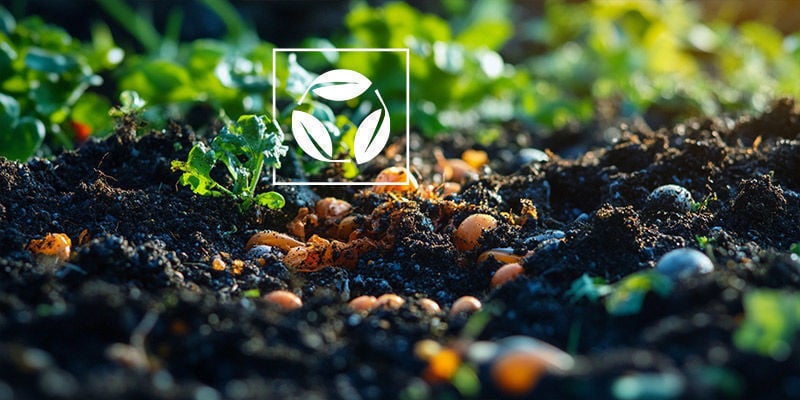
Organic living soil is a complex ecosystem teeming with microorganisms, fungi, and other life forms that work together to break down organic matter into nutrients plants can readily absorb. In untouched, wild spaces, this is how soil (if soil is present) naturally exists: as a thriving ecosystem. However, most agricultural and horticultural soil is comparatively dead, with few, if any, organisms living within it.
The network of organisms that live within organic living soil interact to sustain soil health. Here, plants and soil organisms maintain a symbiotic relationship, where plants exude compounds through their roots that feed microorganisms. In return, these microorganisms convert organic material into bioavailable nutrients, fostering robust plant growth. Both organisms win!
The health of the soil food web—which, until recently, was an almost entirely overlooked part of nature—is crucial to maintaining the vitality of organic living soil and everything that relies on it. A healthy soil food web leads to better water retention, improved soil structure, and enhanced disease resistance in plants. Moreover, organic living soil contributes to the long-term sustainability of agricultural practices by reducing the need for chemical inputs and encouraging biodiversity.
What is the difference between living soil and regular soil?
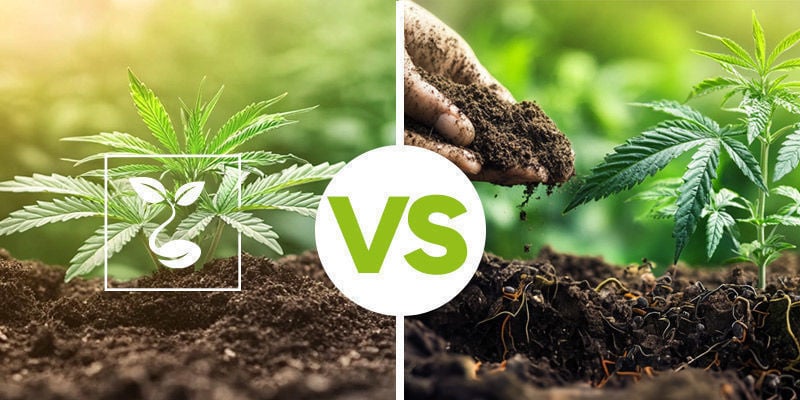
Living soil has many differences to what we might deem “regular” soil (but what could perhaps be better described as “commercial” or “agricultural” soil). Here are some of those differences.
- Microbial activity: Living soil is alive and thriving. Packed with bacteria, fungi, protozoa, and nematodes, all of which contribute to the decomposition of organic matter and nutrient cycling, living soil is, well, full of life. Regular soil, especially when treated with chemical fertilisers or synthetic nutrients, often lacks this degree of biological activity and, as a consequence, is much more inert.
- Nutrient cycling: In living soil, nutrients are constantly recycled and made available to plants through natural processes such as the symbiosis described above. Regular soil may require frequent fertilisation to maintain nutrient levels, as there are no beings in the soil that can act as the necessary catalysts for the desired conversions.
- Soil structure: The presence of organic matter and microbial life in living soil helps to improve soil structure, making it more porous and better able to retain water, which is greatly beneficial to the health of plant roots. Regular soil, particularly when overworked or depleted, can become compacted and less hospitable to plant roots, increasing the likelihood of drowning or oxygen depletion, while also just making it harder to grow.
- Chemical inputs: Synthetic fertilisers and pesticides wreck soil, killing most creatures that live within it and rendering it inert. Organic living soil, on the other hand, creates a balanced ecosystem that not only makes nutrients more available to plants, but also boosts their natural defence mechanisms and reduces the chances of pests appearing. All of this means that living soil actually doesn’t require chemical input in the same way that normal soil does.
Advantages of ROLS
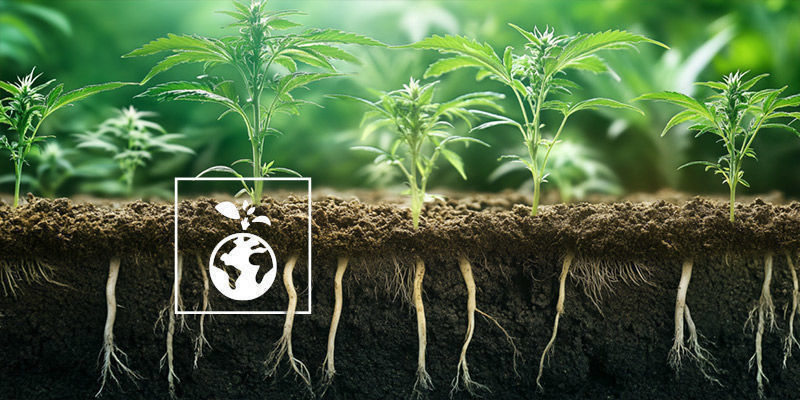
By helping to build up a robust, self-sustaining ecosystem, ROLS offers several advantages to normal soil:
- Sustainability: ROLS reduces the reliance on external inputs like synthetic fertilisers and pesticides, making it an eco-friendly and sustainable choice.
- Nutrient density: Plants grown in living soil often have a higher nutrient content, making them healthier for consumption and potentially more robust in themselves.
- Cost-effectiveness: As pesticides and fertilisers aren’t needed, organic soils are, in the long run, cheaper than those that require constant input.
- Environmental Benefits: ROLS practices contribute to carbon sequestration, reduce runoff, and promote biodiversity.
The Four ROLS Techniques
If you want to implement ROLS in your garden or farm, there are four broad methods that can be employed. Which you decide upon will depend on your unique setup. Below, we examine these four methods.
Biodynamic
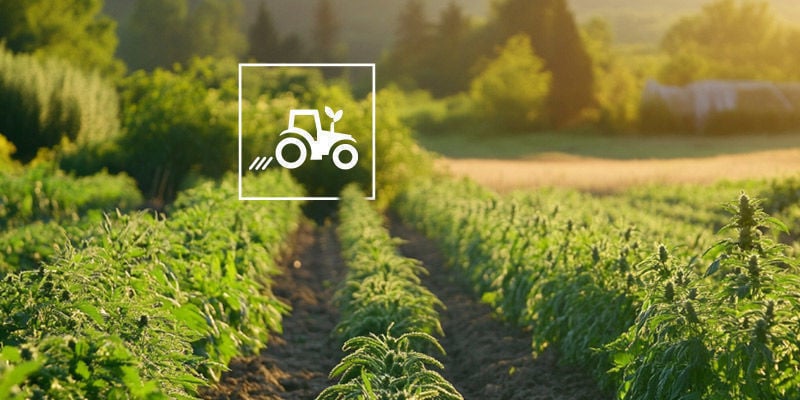
Biodynamic farming is a holistic, ecological, and ethical approach to farming, gardening, food, and nutrition. Developed initially by Rudolf Steiner in the early 20th century, it has since been adjusted and improved upon. As one of the first organic farming movements, it has a special place in the history of environmental movements, and subsequent developments often owe at least something to this method.
Biodynamic farming goes beyond organic by integrating spiritual and cosmic forces into farming practices. Though this might initially turn some people away from this method, bear in mind that the global ecosystem is an interconnected network, and we can’t understand or preserve it without appreciating the full scale of what we’re dealing with. To truly respect it, we do have to treat it with some mysticism, even if this is only necessary because our minds can’t properly conceive of something so vast and interdependent in other terms.
Regardless, the method itself involves the use of specific compost preparations made from fermented manure, minerals, and herbs to enrich the soil and enhance plant health—nothing mystical about that. Biodynamic farmers also follow a planting calendar based on lunar and astrological cycles, which you needn’t necessarily do to use this method.
Permaculture
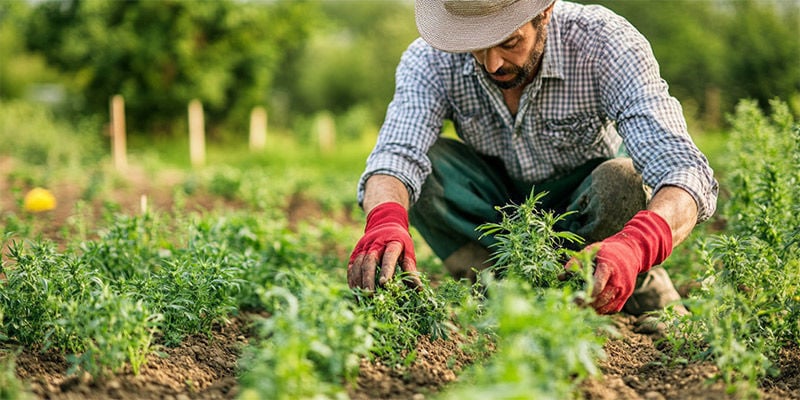
Permaculture is all the rage these days, at least in some circles. As such, it has garnered a mixed reputation, but the underlying principles are sound, and, when practised properly, it is an effective farming method that is highly sustainable.
This farming approach aims to create agricultural systems that mimic natural ecosystems, principally by working with nature rather than against it. In the context of ROLS, permaculture involves designing a farm or garden where every element has multiple functions and everything is recycled back into the system. This method emphasises the use of perennial plants, polycultures, and agroforestry to create a self-sustaining and resilient agricultural environment.
With permaculture, the farmer can be seen as a steward or manager of the environment, rather than a god or overlord. They do not determine all aspects down to the microbial level, but rather manage what grows in such a way that the environment takes care of itself.
Supersoil
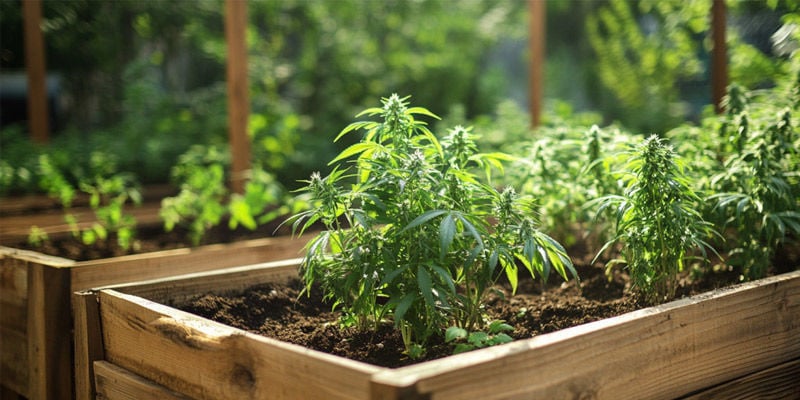
Supersoil refers to a highly enriched soil mix designed to provide optimal growing conditions for plants, particularly in the context of organic gardening. Typically, it consists of a base soil that has been amended with a range of organic matter, compost, worm castings, bat guano, rock dust, and other natural additives to create a nutrient-dense environment. As a consequence, no additional nutrients are needed throughout the growing season, as it becomes self-sustaining.
Supersoil is often used in container gardening or raised beds, where soil quality is paramount. This technique can be particularly useful for growing cannabis and other high-demand crops, ensuring they receive all the necessary nutrients without the need for chemical fertilisers.
No-till
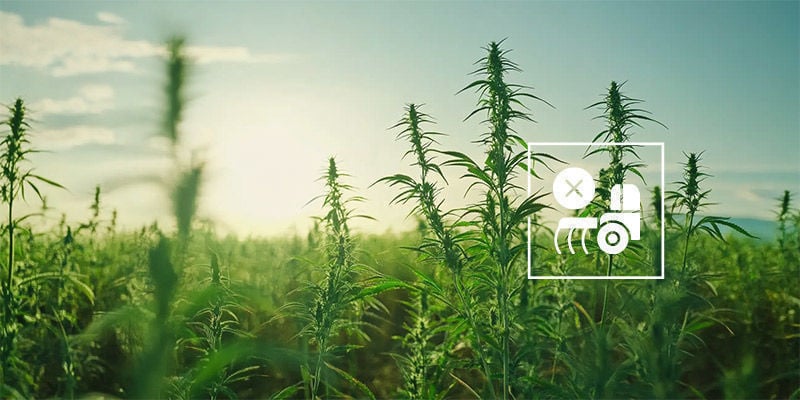
No-till farming is a method that involves growing crops without disturbing the soil through tillage, which, although it may look harmless to our eyes, can seriously disrupt the subterranean world.
This technique preserves the soil structure, reduces erosion, and maintains the organic matter and microorganisms in the soil in a way that can’t be achieved when tilling is employed. In ROLS, no-till farming is crucial as it helps to maintain the integrity of the soil food web. By avoiding tillage, you promote a healthy environment for soil organisms to thrive, which in turn enhances plant growth and soil fertility. No-till farming also helps with carbon sequestration, contributing to the fight against climate change.
How to make ROLS
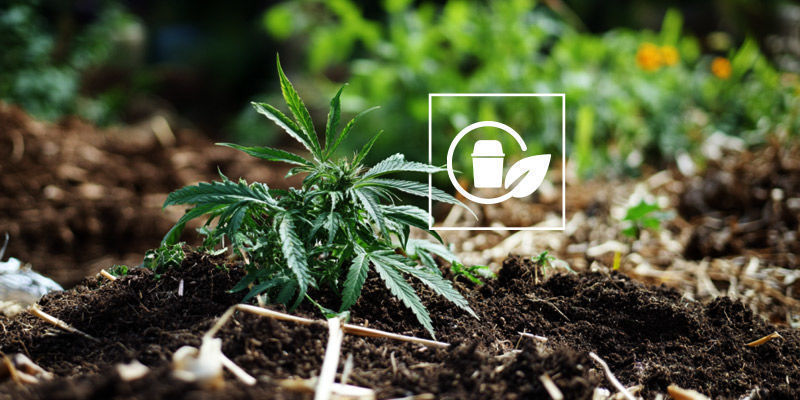
If this all sounds very good, and it really is, especially if you have a garden you’re passionate about and want to consume organic, nutrient-dense crops, then you probably want to know how to make ROLS yourself. In that case, the good news is that there are many simple methods, some of which you’ve probably heard of, or even used before.
Composting
We all know what compost is. Well, ROLS can be as simple as letting your (uncooked) food waste rot!
Composting is the process of breaking down organic matter, such as kitchen scraps, yard waste, and manure, into nutrient-rich compost that can then be used as a soil amendment. This compost is mixed into your soil to improve its fertility and structure.
To start composting, gather organic waste in a compost bin or pile, ensuring a good balance of green (nitrogen-rich) and brown (carbon-rich) materials. Regularly turn the compost to aerate it and speed up the decomposition process. Over time, you’ll have rich, dark compost to add to your living soil.
Compost tea
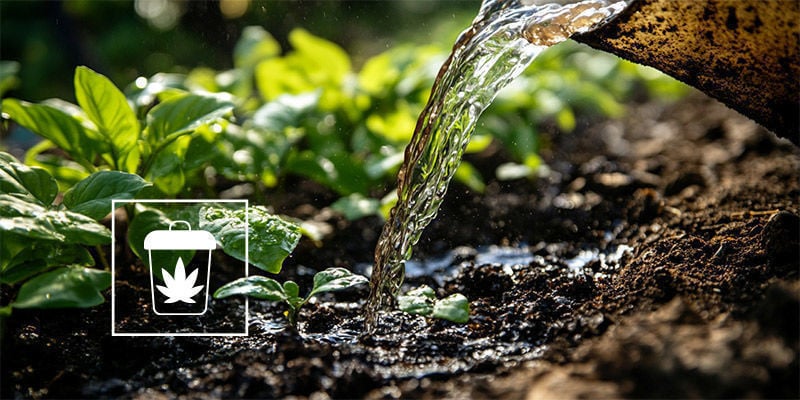
Compost tea is a liquid extract made by steeping compost in water, often with added microbial inoculants to boost the population of beneficial organisms. This “tea” can be applied as a foliar spray or soil drench to enhance plant growth and soil health. Compost tea helps to introduce and maintain beneficial microorganisms in the soil, making it an excellent tool in the ROLS toolkit.
Bokashi
Bokashi is a fermentation process that breaks down organic matter using specific microorganisms. Unlike traditional composting, which requires oxygen, bokashi is an anaerobic process that can handle a wider range of organic materials, including meat and dairy. The result is a pre-compost material that can be buried in the soil, where it rapidly breaks down into nutrients. Bokashi is particularly useful for recycling kitchen waste and adding it directly to your garden beds.
JADAM
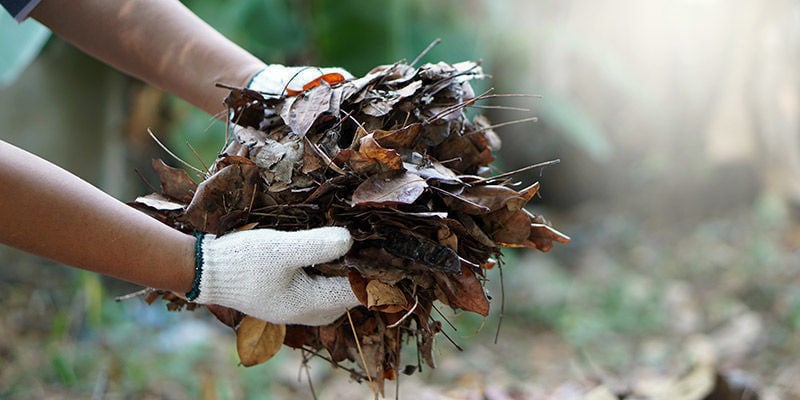
JADAM is an organic farming method that originated in South Korea. It stands for "Jayonul Damun Saramdul", which translates to "People who are like nature". JADAM emphasises the use of homemade inputs, such as natural pesticides and fertilisers, made from locally available materials. One key aspect of JADAM is the use of leaf mould soil, which is rich in microorganisms, to inoculate your garden soil. This method is cost-effective and accessible, making it a great choice for beginners looking to start with ROLS.
Mulching
Mulching involves covering the soil with organic materials, such as straw, wood chips, or leaves, to protect it from erosion, retain moisture, and suppress weeds. In ROLS, mulching also contributes to the soil food web by providing a habitat for beneficial organisms and slowly adding organic matter as it decomposes. Mulching is an easy and effective way to improve the health of your soil without much effort.
Is organic living soil worth it?
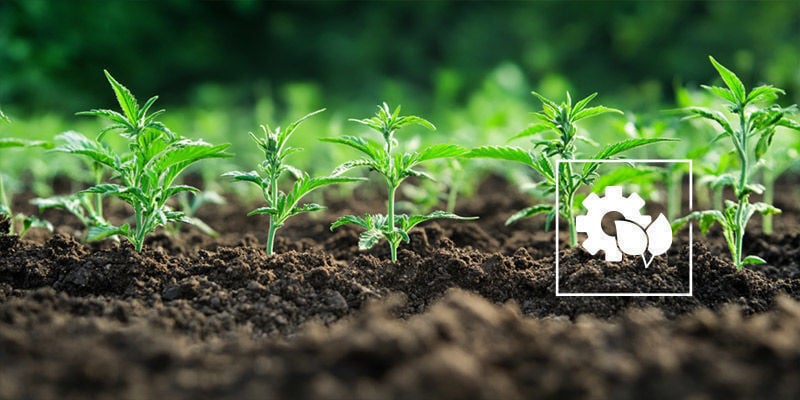
Investing in organic living soil, particularly through ROLS techniques, offers numerous benefits for both the environment and your plants. While it may require an initial investment of time and resources, the long-term rewards far outweigh the costs. ROLS promotes sustainable gardening practices, enhances soil fertility, and reduces the need for synthetic inputs. Moreover, the rich, nutrient-dense produce grown in living soil is healthier and more flavorful.
For growers, whether hobbyists or professionals, ROLS provides a route to more sustainable, cost-effective, and environmentally friendly agriculture. By nurturing the soil food web and recycling organic matter, you can create a thriving ecosystem in your garden that will continue to yield abundant, healthy crops for years to come.
-
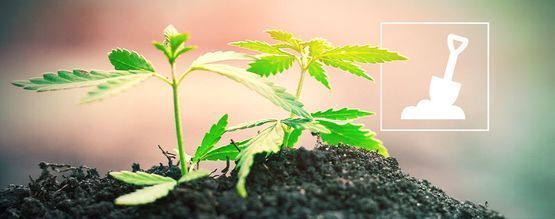 5 min
30 June 2022
Everything You Need To Know About Growing Cannabis In Soil
While it may initially seem tricky, we assure you, finding the right soil for growing cannabis needn’t be stressful. We delve into everything you need to know about the ideal soil for weed, other...
5 min
30 June 2022
Everything You Need To Know About Growing Cannabis In Soil
While it may initially seem tricky, we assure you, finding the right soil for growing cannabis needn’t be stressful. We delve into everything you need to know about the ideal soil for weed, other...
-
 6 min
1 April 2021
How To Make The Best Soil Mix For Growing Cannabis
Cannabis plants depend on soil rich in nutrients and beneficial microbes. Discover how to make the perfect soil mix below. Your plants will thank you!
6 min
1 April 2021
How To Make The Best Soil Mix For Growing Cannabis
Cannabis plants depend on soil rich in nutrients and beneficial microbes. Discover how to make the perfect soil mix below. Your plants will thank you!
-
 4 min
10 August 2020
How To Make Your Own Compost For Growing Cannabis
Composting enables cannabis growers to create their own nutrient-rich soil amendment for free. Not only will doing so lower your carbon footprint, but it will bring the health of your garden—and...
4 min
10 August 2020
How To Make Your Own Compost For Growing Cannabis
Composting enables cannabis growers to create their own nutrient-rich soil amendment for free. Not only will doing so lower your carbon footprint, but it will bring the health of your garden—and...
-
 4 min
31 December 2018
What's The Difference: Synthetic Vs. Natural Fertilizer
Synthetic vs organic fertiliser is a heavily debated topic when it comes to growing cannabis. So let’s take a look at the advantages and disadvantages of each.
4 min
31 December 2018
What's The Difference: Synthetic Vs. Natural Fertilizer
Synthetic vs organic fertiliser is a heavily debated topic when it comes to growing cannabis. So let’s take a look at the advantages and disadvantages of each.
-
 3 min
5 August 2018
Using Coconut Water As Organic Cannabis Fertiliser
Coconut water is an all-natural cannabis growth accelerator for organic and hydroponic growing systems. It boosts clone development, enhances root growth from seeds, and boosts overall plant...
3 min
5 August 2018
Using Coconut Water As Organic Cannabis Fertiliser
Coconut water is an all-natural cannabis growth accelerator for organic and hydroponic growing systems. It boosts clone development, enhances root growth from seeds, and boosts overall plant...
-
 4 min
16 October 2017
How To Grow Huge Ass Buds: 10 Steps To Success
Cannabis cultivators of all levels have one thing in common. We are all looking for a fat stash of our favourite marijuana. If you want to grow enormous cannabis colas, you need to take 5 minutes...
4 min
16 October 2017
How To Grow Huge Ass Buds: 10 Steps To Success
Cannabis cultivators of all levels have one thing in common. We are all looking for a fat stash of our favourite marijuana. If you want to grow enormous cannabis colas, you need to take 5 minutes...









 United States
United States














